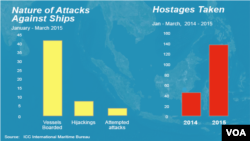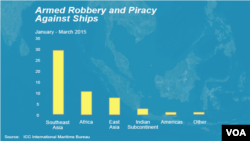After a steady decline in maritime hijackings over the last few years incidents of attacks by pirates on the seas rose 10 percent in the first quarter of this year, compared to the same period in 2014, according to the International Maritime Bureau (IMB).
“It is a disturbing trend because if firm action is not taken then we expect that the violence will increase and the pirates will get a little more audacious in the kind of targets that they will look for,” said IMB director Pottengal Mukundan, speaking to VOA from the bureau's piracy reporting center in Kuala Lumpur.
The most dangerous waters are in Southeast Asia which accounted for more than half of all attacks since the beginning of 2015 with a small coastal tanker being hijacked by armed pirates in the region on average every two weeks.
“These vessels are inherently vulnerable because they're very slow and they're very low in the water,” said Mukundan. “The hijackers approach the vessel in very fast skiffs. They take over the ship and then they siphon or steal part of the cargo on board — usually marine gas oil, diesel oil, that kind of product which can be very quickly disposed of locally.”
The country with the highest number of attacks, so far this year, is Indonesia, accounting for almost 40 percent of the total.
The overwhelming majority of these incidents are carried out by “opportunistic thefts, although the attackers here are usually armed with knives, machetes or guns,” according to the IMB report.
With eight reported incidents in the past three months, Vietnam has seen an increase in armed robbery incidents, with ships being broken into at anchor in and around Haiphong and Vung Tau.
A notable improvement has been seen off Somalia where no incidents have yet been reported this year.
The last reported hijacking in those waters was in May, 2012.
The dearth of pirate attacks is attributed to Somalia again having a functioning government, a multi-national naval patrol against pirate mother ships and targeted ships adopting anti-piracy measures, including onboard armed guards.
But IMB's Mukundan cautions it would be very easy for the situation to return to the bad old days.
“All it takes is one successful hijacking and suddenly people will get interested once more in this criminal activity. So we've got to be watchful, the ships have got to be vigilant and we need the navies there,” he said.
West Africa continues to be a hotspot for violent piracy with one man killed this year in the hijacking of a fishing vessel off Ghana. Five crew members were kidnapped by Nigerian pirates in two separate incidents in addition to a small product tanker being reported hijacked.
The IMB, a division of the International Chamber of Commerce has been monitoring piracy on the seas since 1991.






